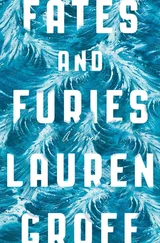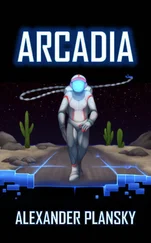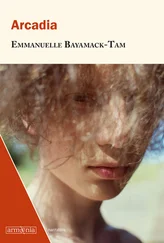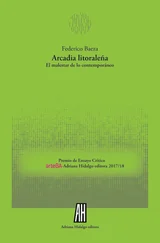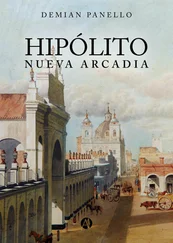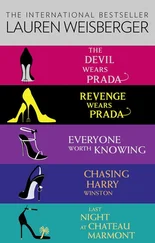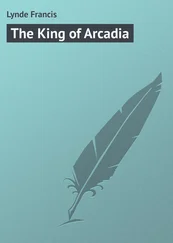Bit stops listening: Helle is nearing, under a huge sombrero, clutching a bouquet of cornflowers. She sits beside him and gives him the flowers. He holds out for ten seconds. Then he touches her thin ankle, forgiving her. She touches his knee, grateful to be forgiven.
After the discomfort passes — blazing sun forgotten, hotspots numbed to blisters, shoulders’ rise and dip overcoming the ache by sheer repetition — the future sharpens before him, the way every blade of grass on a clear summer morning seems etched by a pin. He is in Arcadia still. He feels himself older, his body tighter in the joints, the muscles softer. He can feel his parents nearby. And Helle is there, older, too, and smiling, and she loves him.
He feels his hope breathing and stretching, a living creature.
He closes his eyes to keep the daydream in. Fervently, he bargains. It doesn’t have to be as perfect as it had been in the brief pulse of a vision. He knows that a longing for perfection is the hole in the dam that can let everything pour out. He doesn’t have to be as elevated as Handy when he’s older, or even Abe, or even Titus; he can be a normal person, a worker bee, a Wolf. Helle doesn’t have to be so beautiful; she could lose her looks tomorrow, it wouldn’t matter. If he had to give up the quiet, good dreams he has started to have about himself, a life of making photographs, for Helle loving him, for living the rest of his life in Arcadia, he would.
He focuses again. Cole is at the end of the row looking at Bit, lines between his eyebrows. You okay, man? Cole says.
Language fails Bit. No words could possibly contain all he has to say. He manages to utter, at last, I’m okay, and this is enough for now.
The gang is in its hideaway in the basement, finishing the prank. Helle’s music blares on the deck, cassettes she’d shoplifted in the Outside. Cole nods to the driving beat, Dylan winces, Ike thrashes. Bit tries to listen, to love it, but unlike the friendly folk of his youth, this music is furious, full of rusted nails and bile, the darkness in the world beyond. It feels like private anarchy. Bit hopes nobody in the rooms above can hear.
Punk, Ike had said in his jittery way the first time he put it on. Sex Pistols. Fuck, yeah! Now he lies on a broken settee and spins out names for their own band.
The Pissers, the Fockups, Badmass Mothafathas, he says.
Dylan says, Spade and the Whities.
The rest are careful not to look at one another. Two months ago, Dylan discovered he was black, though everyone else, it seems, had known for years. Now Dylan teases his hair into a short Afro and hangs out at the Motor Pool with Peanut. Now he axes, digs, finnas to do. It is embarrassing to peachy white Cole how unnatural this language sounds in his little brother’s mouth, how hard he seems to be trying.
Hearts of Darkness, Biohazards, the Bloody Mayhem. Shrimp and the Shrimptones. No, no, no! Bit Sinister and the Kidney Stones, says Ike.
Bit puts down the toadstool on which he has glued a Monopoly house, liberated from a half-dead game at the Store. He is weary of his friends. Under his several pressures — the crop in the woods, Helle screaming at him the other night, sweet to him this afternoon — the boys seem childish, stuck in their innocence. Helle had invited Bit to a party at the Runaway Quonset tonight, Break down the invisible barriers between the Old and the New! she’d said. End the apartheid! but Bit had refused out of a sense of duty to his friends. Now he has a pang of regret. He would like to be near Helle, if just to insulate her from people like Armand Hammer.
He says, How about Antonine Plague and the Buboes?
Cole whistles. The other two go quiet. Then Dyllie nods and says, If that in’t just like Bit Sinister. Don’t say much, but when he do, it’s right on.
Right on, echoes Ike. Antonine Plague and the Buboes. Lead singer Isaac Vomit.
Excuse me? Cole says. Your voice is shit.
It’s punk . It’s supposed to be shit, says Ike, and Bit relaxes into their squabble.
Their hideaway is behind a heap of furniture that the Free People salvaged when they renovated Arcadia House so long ago: it is all broken, but not impossibly, waiting eight years for somebody to have free time to patch it up and put it back into commission. The boys have strung the marijuana plants they gleaned from the woods on the rafters, where they hang like sleeping bats. Cole rolls a spliff and passes it around. When Bit breathes the smoke out, the world relaxes the close of its fist on him.
He is grateful for marijuana. He’s sure it’ll stunt his growth, but he’s resigned to being five foot three. His friends have all beanpoled over six foot, even Dyllie, who is younger than Bit, thirteen in a month.
Bit shakes the gold paint he took from the Motor Pool and sprays the whole project.
Finished, he says. The others stand to look at his handiwork. Cole gives a low whistle. Bit Sinister, he says, you’re a fucking artist, man.
On a board, there is a tiny golden village of toadstools and windmills and even an octagonal barn Bit made of an oatmeal cylinder.
Time check, Bit says, and Dyllie looks at the clock he liberated from the Biz Unit, the only people who have a timepiece in Arcadia. He says, 4:30 a.m.
Showtime, Bit says. Ike gives a giggle. They put the balaclavas Peanut bought for them at Kmart over their faces. Now they are complete, transformed into their own dark side. A hippie gang, utopian goons; they call themselves the Sowers of Destruction.
They creep out into the night. Ike and Cole carry the diorama between them, Dyllie a bag of moss, Bit the box of accoutrements. Beyond the Tool Corner, the Pottery wheels, up the root cellar steps, into the courtyard. They hear a sound and pause to listen, but it is only the tap of oak branches against windows. They can still hear the party raging down at the Runaway Quonset, and Bit has to hold his breath to banish the thought of Helle high, Helle kissing someone else, Helle passed out on the floor.
Into the Children’s Wing they go, into the Schoolroom, up the stairs in their bare feet.
The breath of the sleeping children fills the Dormitory with sweetness. Maria and Phyllis sleep on cots in the corner; Sweetie sits in the overstuffed chair in the play area, snoring. The boys lower the miniature Arcadia carefully to the ground, and Bit takes out the sphagnum moss. Silently, they cover the board and its edges and place other bits of moss and wee ferns throughout the room. Ike sprinkles glitter on the pillows of the kidlets. Cole puts the teacups made of acorns on the windowsills. Dyllie scatters the pieces of birch bark with tiny cuneiform scratched on them. Bit presses footprints over every surface with a clothespin and baby powder.
Just before they leave, Bit motions the other three out. This is the trickiest moment, and if someone is to be caught, it should be him. He can contort himself out of punishment like a small Houdini. He closes a window and it comes down softly. Into the sill crack, he places two dozen butterfly wings: blue-dazzled, green, yellow, luna pale, moth brown with furry startled eyes.
Now he joins his friends out under the oak, leans against its warmth. It is near dawn. The cooks move in the Eatery.
Soon from the window they hear a little voice say a dazzled Oooooooh. Then it calls out, Wake up, wake up, wake up, the fairies have been here! Everyone, wake up!
Ike snorts into his hands. Cole bites his smile into his knees. Dyllie laughs.
Upstairs, the children shout, gleeful, voices pitched high. Sweetie laughs, delighted. And then a voice screams: Oh, my God! and begins to wail, and now Bit pictures a little girl finding the wings in the sill. He can see the delight fall off her face, her stricken expression when she understands that the fairies were smashed when the window fell.
Читать дальше
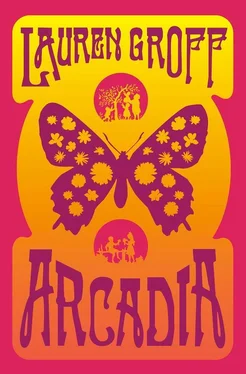
![Andrea Höst - In Arcadia [Touchstone - Extras]](/books/56405/andrea-host-in-arcadia-touchstone-extras-thumb.webp)

